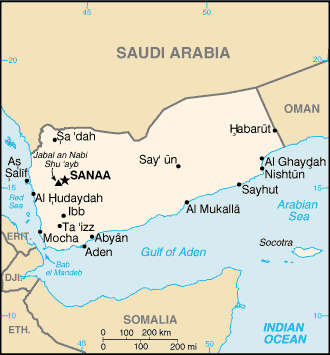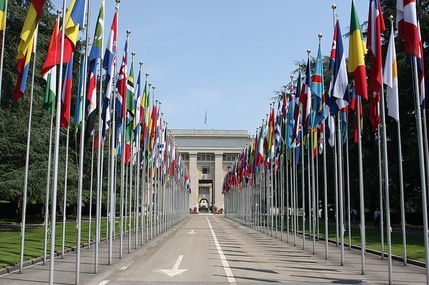The conflict has killed more than 3,000 people. Envoy Ahmed said: "For the humanitarian pause, we are going to start tomorrow evening and we have assurances from all the parties, and we are quite optimistic it will be respected.We have agreed to go ahead, based on two major points. The first is the commitment of all parties not to violate this ceasefire, this humanitarian pause. The second is that humanitarian assistance can reach all parts of Yemen". Ahmed had just completed talks with the Houthis in Sanaa.
Earlier attempts to agree to a cease fired had foundered due to the government in exile of President Hadi insisting that the Houthis withdraw from key cities that they had occupied as a condition of any ceasefire. No doubt the Saudis and other allies told Hadi to agree to a cease fire without any conditions as appears to have happened. Relief agencies claim that more than 80 per cent of the 23 million Yemenis need emergency aid. Those who are able have fled the country. The Saudi blockade and allied militias often block aid to Houthi areas but the Houthis too have tried to disrupt aid or block aid to areas they do not control. At least the humanitarian pause is a step in the right direction. It may also allow time for more discussions between competing groups. However, AQAP will no doubt continue fighting the Houthis whether there is a cease fire or not. The group fought against the government of Hadi when it had control as well. Sources: http://www.nytimes.com/2015/07/10/world/middleeast/yemen-truce-agreement-is-reached-un-announces.html?_r=0 http://uk.reuters.com/article/2015/07/09/uk-yemen-security-idUKKCN0PJ1JD20150709 http://www.democracynow.org/2015/7/9/a_mounting_humanitarian_catastrophe_in_yemen
0 Comments
"UN Emergency Relief Coordinator Stephen O'Brien described the situation confronting the population of the Arab world’s poorest country as “catastrophic,” placing much of the blame on the Saudi-led air strikes that have devastated Yemeni cities, and Saudi Arabia’s blockade of Yemen’s ports, which have prevented not only the arrival of emergency relief supplies but also the basic flow of goods that existed before the war.
“The blockade means it’s impossible to bring anything into the country,” Nuha Abdul Jaber, Oxfam’s humanitarian program director in the Yemeni capital of Sanaa told the Guardian newspaper. “There are lots of ships, with basic things like flour, that are not allowed to approach. The situation is deteriorating, hospitals are now shutting down, without diesel. People are dying of simple diseases. It is becoming almost impossible to survive.” Earlier attempts at peace talks failed when the Hadi government in exile demanded concessions from the Houthi rebels as a condition of attending. This time, there are no preconditions. Dahllallah a-Shami, a senior member of the political wing of the Houthi rebels said the group would not accept preconditions set by other parties: We accepted the invitation of the United Nations to go to the negotiating table in Geneva without preconditions," said Daifallah al-Shami, a senior member of the rebels' political wing. Ezzedine al-Isbahi, information minister of the Saudi-backed Hadi government reported from Ryadh, the Saudi capital. that it would also send representatives to the talks in Geneva. Al-Isbahi said that the meeting would involve "consultations on implementing Resolution 2216" of the UN Security Council that was passed in April. This resolution imposed an arms embargo on the Houthis and demanded they relinquish seized territory. According to diplomats who attended a closed-door Security Council meeting the meeting will discuss a ceasefire, increased deliveries of humanitarian aid, and agreement on a Houthi withdrawal plan. There may be difficulties negotiating the withdrawal of the Houthis from territory they have captured unless the Saudis are willing to offer the Houthis a government that they find acceptable. The new vice-president appointed by Hadi may be acceptable to the Houthis as the leader of a unity government but the Houthis took power because earlier negotiations sponsored by the UN had failed to reach agreement on a government acceptable to all sides. Of course, AQAP remains outside any negotiations. The Southern Movement separatists will no doubt demand increased autonomy at the very least as a condition of their agreeing to any proposed government. At present they are fighting against the Houthis. The group wants a separate state of South Yemen as existed in the past. Sources: http://www.npr.org/2015/06/06/412445504/un-led-yemen-peace-talks-are-set-for-june-14 http://news.antiwar.com/2015/06/05/yemen-rebels-govt-both-agree-to-un-peace-talks/ http://wtop.com/politics/2015/06/un-chief-says-yemen-peace-talks-to-resume-june-14-in-geneva/ |
Like this writer's work please donate:
Ken Hanly
Ken is a retired philosophy professor living in the boondocks of Manitoba, Canada, with his Filipina wife. He enjoys reading the news and writing articles. Politically Ken is on the far left of the political spectrum on many issues.
Archives
November 2016
Categories
All
|


 RSS Feed
RSS Feed

